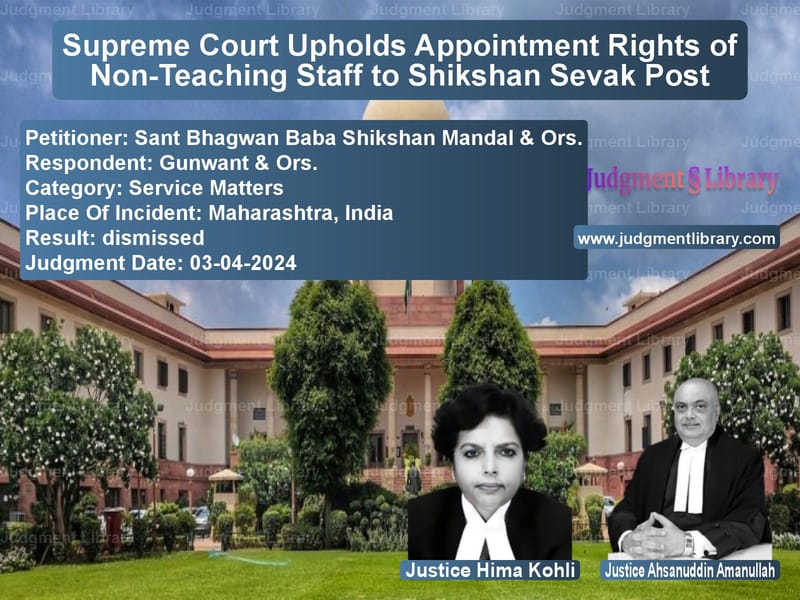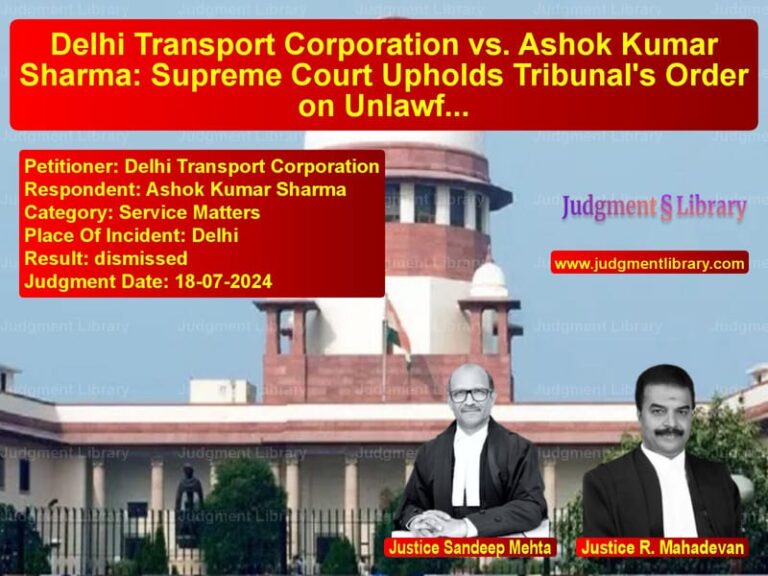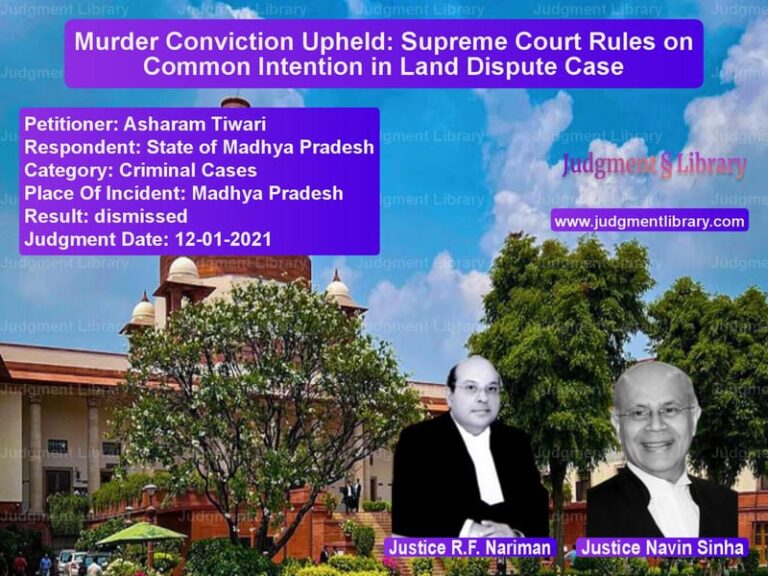Supreme Court Upholds Appointment Rights of Non-Teaching Staff to Shikshan Sevak Post
The Supreme Court of India recently ruled in favor of Gunwant & Others in a long-standing dispute over the appointment of a non-teaching staff member to the post of Shikshan Sevak. The case, Sant Bhagwan Baba Shikshan Mandal & Ors. vs. Gunwant & Ors., revolved around whether a non-teaching employee, who had later acquired the requisite qualifications, was eligible for appointment as a teacher.
Background of the Case
The dispute arose when Gunwant, originally employed as a Peon at Sant Bhagwan Baba Shikshan Mandal in Maharashtra, completed his Bachelor of Arts degree in 2004 and his Bachelor of Physical Education in 2005. He then sought appointment as a Shikshan Sevak under Maharashtra’s education policy.
Despite his qualifications, the school management did not appoint him to the teaching position. Instead, it issued an advertisement inviting applications from the public and filled the position with another candidate, leading to a legal challenge.
Legal Issues Considered
The Supreme Court examined the following key legal questions:
- Whether a non-teaching employee can be considered for a Shikshan Sevak post after acquiring the required educational qualifications.
- Whether the school management violated Maharashtra’s education policies by ignoring Gunwant’s application.
- Whether the appointment of another candidate instead of Gunwant was legally valid.
Arguments by the Appellants (Sant Bhagwan Baba Shikshan Mandal)
- The school management argued that a Peon cannot be automatically promoted to a teaching position.
- It claimed that recruitment must be conducted through a proper selection process, and Gunwant did not apply through the advertised process.
- The management relied on the Maharashtra Employees of Private Schools (Conditions of Service) Rules, 1981, which mandates maintaining separate seniority lists for teaching and non-teaching staff.
Arguments by the Respondents (Gunwant & Others)
- Gunwant argued that he was eligible for the teaching position under a Government Resolution (GR) dated 10th June 2005, which permitted non-teaching employees with proper qualifications to be appointed as Shikshan Sevaks.
- He had informed the management about his qualifications and requested consideration for the vacancy.
- The management ignored his application and issued a general advertisement, violating state policy.
High Court’s Decision
The Bombay High Court ruled in Gunwant’s favor, directing the school management to appoint him as a Shikshan Sevak. The school then challenged this ruling before the Supreme Court.
Supreme Court’s Judgment
The Supreme Court upheld the High Court’s decision and ruled in favor of Gunwant. The key observations were:
1. Government Policy Permits Appointment of Non-Teaching Staff as Teachers
- The Court noted that Maharashtra’s Shikshan Sevak Scheme allows qualified non-teaching staff to transition to teaching roles if vacancies exist.
- The scheme explicitly states that non-teaching employees with necessary educational qualifications must be considered for available teaching positions.
2. School Management Failed to Follow Due Process
- The management ignored Gunwant’s application and issued an advertisement instead, which was deemed arbitrary.
- There was no evidence that the management sought approval from the Education Inspector, which is a mandatory requirement for filling such vacancies.
3. Appointment of Another Candidate Was Invalid
- The Supreme Court ruled that the appointment of the new candidate was conditional upon the outcome of Gunwant’s legal challenge.
- The management was directed to compensate Gunwant with Rs. 10,00,000 for financial loss due to delayed appointment.
Final Orders
- Gunwant was deemed appointed as a Shikshan Sevak from January 1, 2010, and as an Assistant Teacher from January 1, 2013.
- The school was directed to provide a notional pay scale and ensure proper seniority benefits.
- The wrongly appointed candidate would be accommodated elsewhere if a vacancy was available.
Legal Implications of the Judgment
This ruling has significant implications for education sector employees:
- Non-teaching staff have a right to career advancement if they meet educational requirements.
- Schools must follow due process and cannot arbitrarily exclude qualified internal candidates.
- Government policies must be implemented fairly to ensure justice for employees.
Conclusion
The Supreme Court’s ruling in Sant Bhagwan Baba Shikshan Mandal vs. Gunwant & Ors. upholds the principles of fairness and employment rights. By ensuring that a qualified non-teaching employee was considered for a teaching position, the Court reinforced the importance of following government policies and providing equal opportunities for career advancement.
Petitioner Name: Sant Bhagwan Baba Shikshan Mandal & Ors..Respondent Name: Gunwant & Ors..Judgment By: Justice Hima Kohli, Justice Ahsanuddin Amanullah.Place Of Incident: Maharashtra, India.Judgment Date: 03-04-2024.
Don’t miss out on the full details! Download the complete judgment in PDF format below and gain valuable insights instantly!
Download Judgment: sant-bhagwan-baba-sh-vs-gunwant-&-ors.-supreme-court-of-india-judgment-dated-03-04-2024.pdf
Directly Download Judgment: Directly download this Judgment
See all petitions in Recruitment Policies
See all petitions in Public Sector Employees
See all petitions in Promotion Cases
See all petitions in Judgment by Hima Kohli
See all petitions in Judgment by Ahsanuddin Amanullah
See all petitions in dismissed
See all petitions in supreme court of India judgments April 2024
See all petitions in 2024 judgments
See all posts in Service Matters Category
See all allowed petitions in Service Matters Category
See all Dismissed petitions in Service Matters Category
See all partially allowed petitions in Service Matters Category







